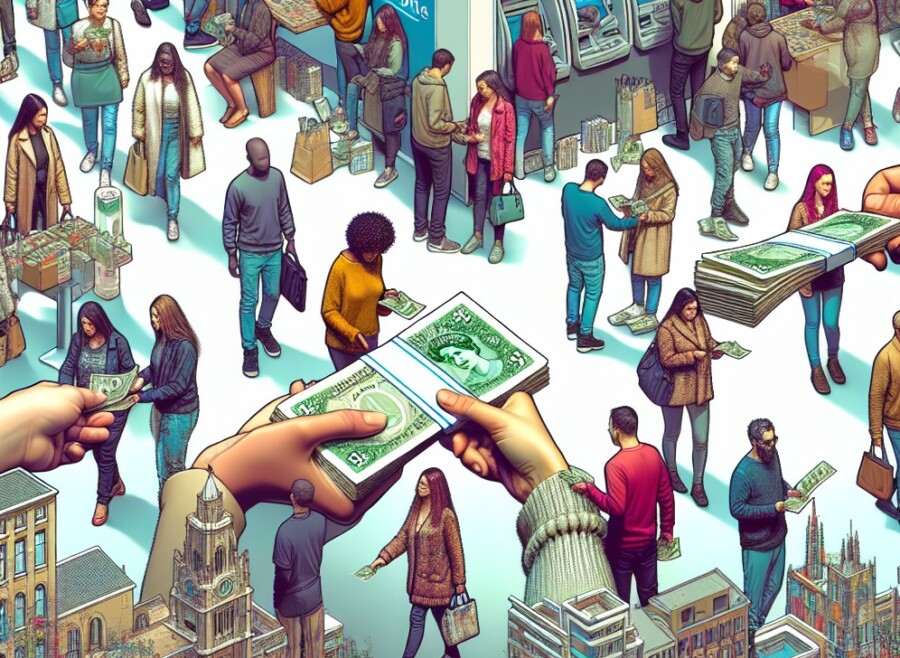Cash usage in the UK has increased for the first time in a decade, according to the British Retail Consortium. The consortium reported that 19% of purchases were made with cash last year, up from 15% the previous year. This trend is attributed to shoppers closely monitoring their budgets as prices rise. The increase in cash usage comes as the UK government proposes new rules to ensure access to cash. Under these rules, banks will be fined if they cannot provide cash withdrawal or deposit services. The government aims to ensure that free access to cash is available within one mile in urban areas and three miles in rural areas.
The rise in cash usage reflects consumers’ careful budgeting in response to the cost of living pressures. The pandemic also played a role in the return to cash, as it had declined during that time. However, the consortium noted that card payments still dominate, and cash usage is expected to decline in the future. Retailers continue to face increasing fees for accepting card payments. In September, UK Finance reported a similar increase in cash usage, but predicted a decline once the current financial squeeze eases. Despite this, there is still pressure to ensure access to cash as bank branches and ATMs close.
To address concerns about access to cash, the Financial Conduct Authority (FCA) has proposed new rules for banks and building societies. These rules require them to assess and address gaps in local cash provision. The FCA aims to prevent people and businesses from facing unreasonable costs or difficulties in accessing their money. Lenders will be required to provide additional cash services to fill gaps in access, taking into account factors such as transport links and the age of the local population. The FCA’s goal is to manage the pace of change and ensure that people can continue to access cash if needed.
The proposed rules come after the FCA was granted new powers by the Financial Services and Markets Act 2023. However, these powers do not allow the FCA to prevent bank branches from closing. The FCA acknowledges that while digital payments are increasing, there are still over three million consumers who rely on cash, particularly vulnerable individuals. The new rules aim to strike a balance between the shift to digital payments and the continued need for cash access. The FCA invites individuals to share their experiences with cash usage and access by contacting them.
Original news source: Shopping with cash rises for first time in a decade (BBC)
Listen:
Slow
Normal
Fast
Group or Classroom Activities
Warm-up Activities:
– News Summary
Instructions: Divide the class into pairs or small groups. Give each group a few minutes to read the article. Then, ask them to write a brief summary of the main points of the article. Afterward, have each group share their summaries with the class.
– Opinion Poll
Instructions: Prepare a list of questions related to the topic of cash usage in the UK. Divide the class into pairs or small groups and give each group a set of questions. Instruct them to discuss the questions and record their opinions. Afterward, have each group share their opinions with the class and facilitate a class discussion based on the different viewpoints.
– Vocabulary Pictionary
Instructions: Prepare a list of vocabulary words related to the article. Divide the class into teams and give each team a different word. Instruct them to draw a picture that represents the word and have their teammates guess the word within a time limit. The team that guesses the most words correctly wins.
– Pros and Cons
Instructions: Divide the class into two groups. Assign one group the task of listing the pros of using cash, and assign the other group the task of listing the cons. Give each group time to brainstorm and write down their ideas. Afterward, have each group present their lists to the class and facilitate a class discussion comparing the advantages and disadvantages of using cash.
– Future Predictions
Instructions: Instruct the students to imagine themselves in the year 2030. Ask them to write a short paragraph or give a brief presentation predicting the future of cash usage in the UK based on the information in the article. Encourage them to consider factors such as technology advancements, changing consumer behavior, and government regulations. Afterward, have a class discussion to share and compare their predictions.
Comprehension Questions:
1. According to the British Retail Consortium, how much of purchases were made with cash last year?
2. What is the reason for the increase in cash usage in the UK?
3. What will happen to banks if they cannot provide cash withdrawal or deposit services?
4. What is the government’s goal in terms of access to cash in urban and rural areas?
5. Despite the increase in cash usage, what still dominates in terms of payment method?
6. What did UK Finance predict about cash usage in the future?
7. What has the Financial Conduct Authority (FCA) proposed in order to address concerns about access to cash?
8. What factors will lenders need to consider when providing additional cash services to fill gaps in access?
Go to answers ⇩
Listen and Fill in the Gaps:
Cash usage in the UK has increased for the first time in a decade, according to the British Retail Consortium. The consortium reported that 19% of purchases were made with cash last year, up from 15% the previous year. This trend is (1)______ to shoppers closely monitoring their budgets as prices rise. The increase in cash usage (2)______ as the UK government proposes new rules to ensure access to cash. Under these rules, banks will be fined if they cannot provide cash withdrawal or (3)______ services. The government aims to ensure that free access to cash is (4)______ within one mile in urban areas and three miles in rural areas.
The rise in cash usage reflects consumers’ careful budgeting in (5)______ to the cost of living pressures. The pandemic also played a role in the return to cash, as it had declined during that time. However, the consortium noted that card payments still dominate, and cash usage is expected to decline in the (6)______. Retailers continue to face (7)______ fees for accepting card payments. In September, UK Finance reported a (8)______ increase in cash usage, but predicted a decline once the current financial squeeze eases. Despite this, there is still pressure to ensure access to cash as bank branches and ATMs close.
To address concerns about access to cash, the Financial Conduct Authority (FCA) has proposed new rules for banks and building societies. These rules require them to assess and address gaps in local cash provision. The FCA aims to prevent people and (9)______ from facing unreasonable costs or difficulties in (10)______ their money. Lenders will be required to provide additional cash (11)______ to fill gaps in access, taking into account factors such as transport (12)______ and the age of the local population. The FCA’s goal is to manage the pace of change and ensure that people can continue to access cash if needed.
The proposed rules come after the FCA was granted new powers by the (13)______ Services and Markets Act 2023. However, these powers do not allow the FCA to prevent bank branches from closing. The FCA acknowledges that while (14)______ (15)______ are increasing, there are still over three million consumers who rely on cash, particularly vulnerable (16)______. The new rules aim to strike a balance between the shift to digital payments and the continued need for cash access. The FCA invites individuals to share their experiences with cash usage and access by contacting them.
Go to answers ⇩
Discussion Questions:
Students can ask a partner these questions, or discuss them as a group.
1. What are some reasons why people still prefer to use cash for their purchases?
2. How would you feel if you had to travel a long distance just to access an ATM or bank branch?
3. Do you like using cash for your purchases? Why or why not?
4. What do you think are the advantages of using cash instead of card payments?
5. How do you budget your expenses? Do you find it easier to budget with cash or card payments?
6. Do you think it’s important for the government to ensure access to cash? Why or why not?
7. Have you noticed any changes in your own cash usage during the pandemic? Why do you think that is?
8. What challenges do you think vulnerable individuals may face if access to cash becomes more limited?
9. How do you think the rise of digital payments has affected businesses that rely on cash transactions?
10. Have you ever experienced difficulties in accessing your money? How did it make you feel?
11. What factors do you think should be considered when assessing gaps in local cash provision?
12. How do you think the proposed rules for banks and building societies will impact access to cash?
13. Do you think it’s fair for retailers to face increasing fees for accepting card payments? Why or why not?
14. Have you ever had to change your payment method because a business did not accept cash? How did you feel about it?
15. How do you think the balance between digital payments and cash access can be maintained in the future?
Individual Activities
Multiple Choice Questions:
1. According to the British Retail Consortium, what percentage of purchases were made with cash last year?
(a) 19%
(b) 10%
(c) 25%
(d) 30%
2. What is the reason behind the increase in cash usage in the UK?
(a) Government fines on banks
(b) Decrease in card payments
(c) Pandemic restrictions
(d) Shoppers monitoring their budgets
3. What is the government’s aim regarding access to cash in urban and rural areas?
(a) Free access within three miles in urban areas and one mile in rural areas
(b) Free access within two miles in urban areas and four miles in rural areas
(c) Free access within one mile in urban areas and three miles in rural areas
(d) Free access within four miles in urban areas and two miles in rural areas
4. What is the current dominant form of payment in the UK?
(a) Card payments
(b) Cash payments
(c) Digital payments
(d) Cheque payments
5. What did UK Finance predict about cash usage in the future?
(a) Continued increase in cash usage
(b) Replacement of cash with digital payments
(c) No change in cash usage
(d) Decline once the current financial squeeze eases
6. What is the goal of the Financial Conduct Authority (FCA) in proposing new rules for banks and building societies?
(a) To prevent bank branches from closing
(b) To assess and address gaps in local cash provision
(c) To increase fees for accepting card payments
(d) To promote digital payments over cash usage
7. How many consumers in the UK still rely on cash, according to the FCA?
(a) Less than one million
(b) Over five million
(c) Over three million
(d) Less than three million
8. What is the aim of the new rules proposed by the FCA?
(a) To eliminate the need for cash access
(b) To strike a balance between digital payments and the need for cash access
(c) To prevent the closure of bank branches
(d) To increase the use of card payments over cash usage
True or False Questions:
1. Card payments are losing popularity, and cash usage is expected to increase in the future.
2. The UK government is proposing new rules to ensure access to cash.
3. Banks will be rewarded if they cannot provide cash withdrawal or deposit services under the proposed rules.
4. The Financial Conduct Authority (FCA) has proposed old rules for banks and building societies to address concerns about access to cash.
5. Cash usage in the UK has decreased for the first time in a decade.
6. The British Retail Consortium reported that 19% of purchases were made with cash last year.
7. The increase in cash usage is attributed to shoppers closely monitoring their budgets.
8. The government aims to ensure free access to cash within one mile in urban areas and three miles in rural areas.
Go to answers ⇩
Write a Summary:
Write a summary of this news article in two sentences.
Writing Questions:
Answer the following questions. Write as much as you can for each answer.
1. What is the current trend in cash usage in the UK?
2. What are the reasons behind the increase in cash usage?
3. How do card payments compare to cash usage in the UK?
4. What measures are being proposed to ensure access to cash?
5. What powers does the Financial Conduct Authority have in relation to bank branch closures?
Answers
Comprehension Question Answers:
1. According to the British Retail Consortium, 19% of purchases were made with cash last year.
2. The increase in cash usage is attributed to shoppers closely monitoring their budgets as prices rise.
3. Banks will be fined if they cannot provide cash withdrawal or deposit services.
4. The government aims to ensure that free access to cash is available within one mile in urban areas and three miles in rural areas.
5. Card payments still dominate in terms of payment method.
6. UK Finance predicted a decline in cash usage once the current financial squeeze eases.
7. The Financial Conduct Authority (FCA) has proposed new rules for banks and building societies to assess and address gaps in local cash provision.
8. Lenders will need to consider factors such as transport links and the age of the local population when providing additional cash services to fill gaps in access.
Go back to questions ⇧
Listen and Fill in the Gaps Answers:
(1) attributed
(2) comes
(3) deposit
(4) available
(5) response
(6) future
(7) increasing
(8) similar
(9) businesses
(10) accessing
(11) services
(12) links
(13) Financial
(14) digital
(15) payments
(16) individuals
Go back to questions ⇧
Multiple Choice Answers:
1. According to the British Retail Consortium, what percentage of purchases were made with cash last year?
Answer: (a) 19%
2. What is the reason behind the increase in cash usage in the UK?
Answer: (d) Shoppers monitoring their budgets
3. What is the government’s aim regarding access to cash in urban and rural areas?
Answer: (c) Free access within one mile in urban areas and three miles in rural areas
4. What is the current dominant form of payment in the UK?
Answer: (a) Card payments
5. What did UK Finance predict about cash usage in the future?
Answer: (d) Decline once the current financial squeeze eases
6. What is the goal of the Financial Conduct Authority (FCA) in proposing new rules for banks and building societies?
Answer: (b) To assess and address gaps in local cash provision
7. How many consumers in the UK still rely on cash, according to the FCA?
Answer: (c) Over three million
8. What is the aim of the new rules proposed by the FCA?
Answer: (b) To strike a balance between digital payments and the need for cash access
Go back to questions ⇧
True or False Answers:
1. Card payments are losing popularity, and cash usage is expected to increase in the future. (Answer: False)
2. The UK government is proposing new rules to ensure access to cash. (Answer: True)
3. Banks will be rewarded if they cannot provide cash withdrawal or deposit services under the proposed rules. (Answer: False)
4. The Financial Conduct Authority (FCA) has proposed old rules for banks and building societies to address concerns about access to cash. (Answer: False)
5. Cash usage in the UK has decreased for the first time in a decade. (Answer: False)
6. The British Retail Consortium reported that 19% of purchases were made with cash last year. (Answer: True)
7. The increase in cash usage is attributed to shoppers closely monitoring their budgets. (Answer: True)
8. The government aims to ensure free access to cash within one mile in urban areas and three miles in rural areas. (Answer: True)
Go back to questions ⇧















